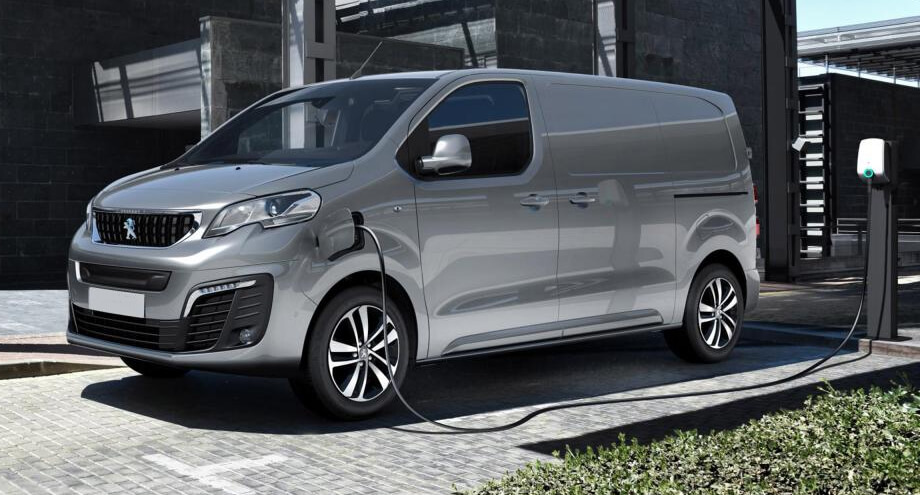A Guide To Electric Vans - Everything You Need To Know

Here you'll find all the pros and cons that come with electric vans. Whether you're just considering going electric or already have your mind set on switching, here's what you need to know:
Why might you switch to an electric van?
As concerns and regulations surrounding environmental pollution continue to grow, more and more businesses are moving towards electrified commercial vehicles.
But it's not just for environmental reasons that they're making the switch: from lower running costs to Government incentives, electric vans can make a real difference to how much you're spending to keep your business moving.
Battery electric vehicles (BEVs, also more simply known as EVs) are an increasingly growing market, with many more models introduced every year. That means there's more variety and choice to suit a wide range of customers.
Plus, with the UK's infrastructure to support EVs growing too, owning an electric van has never been more convenient and therefore appealing to businesses.
Advantages To Electric Vans
Eco-Friendly
One of the most obvious advantages to switching to an electric van is reducing the impact your business has on the environment - powered by an electric motor instead of a traditional combustion engine, electric commercial vehicles are far more eco-friendly.
Producing zero harmful emissions whilst covering many miles in the day, enjoy knowing that your business is contributing to improve air quality and reduce pollution, especially in built-up urban areas.
Additionally, electric vans also reduce your area's noise pollution. Pull up to the next job smoothly and quietly in an electric van - trust us, the neighbours will thank you!
Lower Running Costs
Understandably, electric vans are cheaper to run than fuel-fed alternatives - the cost per mile is considerably lower.
For instance, Citroen have stated that their Berlingo Electric costs 2-3p per mile to run on average - that's less than £2 per 40 miles. Comparing that to the cost of 40 miles of fuel makes the decision to switch a no-brainer.
With electric vans, maintenance costs are also reduced. Notably, there's fewer moving parts inside EVs - there's no pistons pumping up and down, no oil to change and no clutch in the gearbox to wear out. Due to the electric van's braking effectiveness, you'll even find your brake pads and discs lasting longer too!
Incentives
The Government has various schemes in place to encourage the sale of electric vehicles over none-electric; their current plug-in vehicle grant applies to vans as well as cars. The plug-in grant applies at the time of purchase and is given as a discount off the purchase price of the van.
From 18 March 2021 the government will provide grants of up to £3,000 for small vans (less than 2,500 kg gross vehicle weight) and up to £6,000 for large vans (between 2,500 kg and 3,500 kg gross vehicle weight). The vehicle must also have an electric range of at least 70 miles.
With an electric commercial vehicle, you can also expect reduced tax burdens for both business and private use. In addition, there's even grants available to put towards the cost of purchasing and installing workplace chargers.
Other incentives include benefitting from free parking in some areas, exemption from London's Ultra Low Emission Zone (ULEZ) charge and even free EV charging at some public parking destinations.
ULEZ Charge Exemption
In case you weren't sure, the Government defines 'ULEZ' as an area within which all vehicles will have to meet strict emission requirements or face a daily charge to travel.
Similar to cars, all vans must be at least conforming to Euro 6 emission standards if diesel and Euro 4 emission standards if petrol.
Whether you work in London or just visit from time to time, not having a vehicle that meets their regulations means you'll be charged by the day. The daily ULEZ charge is currently £12.50 and up to £100 for vehicles over 3.5 tonnes in weight.
Although it's currently only active in and around London, many other towns and cities have proposed ideas to clamp down on toxic emissions. The UK Government has outlined plans to allow local authorities to introduce their own clean air zones.
Needless to say, having an electric van immediately cuts out this cost, or equally excludes the risk of charges if your area falls into a ULEZ in the future.
Performance
Many say that electric vans are much simpler and more enjoyable to drive, which bodes well when it becomes your office.
When it comes down to it, you press the accelerator to go and you brake (or simply lift off) to stop. There's no changing gear and you'll find they're incredibly nippy around town because electric motors deliver instant torque.
For those that want something completely confident on the road, the Mercedes-Benz e-Sprinter's electric powertrain comprises of a 55kWh battery pack and an electric motor mounted on the front axle. This delivers an output of 114bhp and 295Nm of torque, with a top speed electronically limited to 83mph.
Expect a smooth and relaxing drive in any electric van; apart from a distant hum of power, electric motors are virtually silent.
Valued Image
The PR value on using electric commercial vehicles over fuel-powered ones is quite obvious - customers love to see your business is socially conscious.
In 2020, Amazon bought 1,800 electric vans from Mercedes-Benz for their European delivery fleets, as part of their goal to be carbon-neutral by 2040. 1,200 of these were e-Sprinters and the remaining 600 were the popular eVito.
With many high-profile companies having already adopted completely electric fleets, the benefits to your business' image are proven.
Which business doesn't want to project a highly responsible, eco-conscious image?
Disadvantages To Electric Vans
Range Anxiety
Most electric sceptics would cite this as their main concern - running out of juice whilst on the job would be less than ideal!
Although it's true you won't get as far on a full charge as you would with a full tank, most ranges available with modern electric vans far surpasses the miles covered in the average working day. If your van does cover more ground than most, you will need to consider plugging it in at some point.
Thankfully, manufacturers are listening to driver's concerns and have worked hard to develop new technology to increase this. For instance, Nissan's reliable and hardworking e-NV200 delivers an impressive range of up to 174 miles, making it the ideal option if your business sees long distance journeys regularly. Some of the larger vans do have a relatively low range, which could be impacted further if the van is fully loaded.
Potential For Inconvenience
If you're out in a rural setting, where there may not be as many public charging points, having an electric van can be less convenient than owning a traditionally fuelled van.
Charging does take longer than pumping your van with fuel too. If charging overnight isn't enough for your commercial vehicle, you'll need to factor in time to charge during your working day's schedule - this can be inconvenient too.
Although it's great that the Government is continually increasing the availability of rapid chargers nationwide, there may not be one close to you just yet. Therefore, 'charging up' rather than 'filling up' could be impractical.
Added Weight
Whilst the additional weight that comes with housing an electric battery isn't really an issue for smaller vans, it's more of a problem for larger vans.
The legal maximum gross vehicle weight (GVW) for a standard UK driving licence is 3.5 tonnes, with many large vans already using every kilogram of this allowance.
Since the basic weight of battery-powered electric vehicles is typically more than that of a vehicle powered by a diesel engine, this leaves less capacity for payload and reduces the amount of stuff you can legally carry with that 3.5 tonne limit.
Thankfully, the Government has countered this by allowing standard car licence holders to drive electric vans weighing up to 4.25 tonnes, a process that has been labelled the 'alternative fuel payload derogation'. This extra weight allowance compensates for the extra heft of the electric technology, so all-in-all an electric van will still be able to match a diesel equivalent for carrying ability.
Our prediction is that manufacturers will use the updated weight allowance to increase the number of batteries on board their electric commercial vehicles, therefore increasing their mile range too!
Range Variance
The range of an electric van isn't always exactly the figure the manufacturer claims it to be - in reality, the electric range depends on a few factors.
Driving environment, payload weight, driving style and weather can all affect how far an electric van will go on one full charge. For instance, driving your electric van in either really hot or really cold weather (cold being the more common condition in the UK!) is something to consider. Extreme temperatures affect an electric van's battery, which in turn, reduces its range.
Just as your fuel would burn quicker from blasting the air-con in a conventional vehicle, it drains the battery quicker in an EV too.
Luckily, many EV manufacturers are working to fix this. The Renault Kangoo ZE for instance now uses heat pump technology to reduce any disruption caused by challenging weather conditions.
Why come to Vansdirect for electric vans?
At Vansdirect, we have an extensive range of electric vans for you to choose from. We're more than happy to talk you through the models available and help you come to a decision based on your particular needs.
Even if you're still not sure about switching to an electric commercial vehicle option, we can show you a specific cost comparison between electric and conventional fuel, based on your business needs.
With fantastic finance options available too, from leasing and contract hire to hire purchase, we offer you great flexibility.
Get in touch today for a free no obligation quote - our friendly team of experts are ready to help you make the switch.
| Electric Van | Van Size | Range |
| Renault Zoe Van | Car-derived van | 245 miles WLTP |
| Renault Kangoo ZE 33 | Small van | 143 miles WLTP |
| Nissan e-NV200 40kWh | Small van | 124 miles WLTP |
| Citroen Berlingo Electric (old) | Small van | 106 miles NEDC |
| Peugeot Partner Electric (old) | Small van | 106 miles NEDC |
| Maxus eDeliver 3 | Small van | Up to 150 miles WLTP* |
| VW e-Caddy (cancelled for UK) | Small van | 160 miles NEDC |
| Citroen e-Berlingo (2021) | Small van | 171 miles WLTP |
| Peugeot e-Partner (2021) | Small van | 171 miles WLTP |
| Toyota Proace City electric (2021) | Small van | To be confirmed |
| Vauxhall Combo-e (2021) | Small van | 171 miles WLTP |
| Renault Kangoo E-Tech (2022) | Small van | 164 miles WLTP |
| Mercedes-Benz eVito | Medium van | 92 miles WLTP |
| VW e-Transporter | Medium van | 82 miles WLTP |
| Vauxhall Vivaro-e | Medium van | 143-205 miles WLTP* |
| Citroen e-Dispatch | Medium van | 148-211 miles WLTP* |
| Peugeot e-Expert | Medium van | 148-211 miles WLTP* |
| Toyota Proace Electric (2021) | Medium van | To be confirmed |
| Sokon / DFSK EC35 (TBC) | Medium van | 138 miles |
| Morris Commercial JE (2021) | Medium van | 200 miles (untested claim) |
| VW ID Buzz Cargo / ID.7 Cargo (2022) | Medium van | To be confirmed |
| Ford E-Transit Custom (2023) | Medium van | To be confirmed |
| Renault Master ZE | Large van | 124 miles WLTP |
| LDV EV80 | Large van | 127 miles NEDC |
| Mercedes-Benz eSprinter | Large van | 96 miles WLTP |
| Maxus eDeliver 9 (2021) | Large van | 146-184 miles WLTP* |
| VW e-Crafter (2021) | Large van | 68-71 miles WLTP |
| MAN eTGE (2021) | Large van | 68-71 miles WLTP |
| Ford E-Transit (2022) | Large van | 217 miles WLTP |
| Citroen e-Relay (2021) | Large van | 124-211 miles WLTP* |
| Peugeot e-Boxer (2021) | Large van | 124-211 miles WLTP* |
| Fiat E-Ducato (2021) | Large van | 78-148 miles WLTP* |
| Arrival electric van (2022) | Large van | 112-211 miles WLTP* |
* Varies with van and battery size, plus driving conditions and weight loaded in vehicle.















